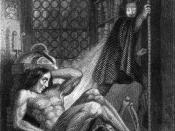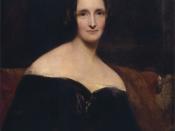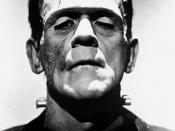Frankenstein
"Imagination is the beginning of creation. You imagine what you desire, you will what you imagine and at last you create what you will."George Bernard Shaw.
Imagination is something that has set human beings apart from the animal kingdom for thousands, perhaps millions of years. It is what has brought about the ability to control our environment: the ability to create. It is the very nature of humans, and subsequently science, to investigate how things work and in the end reproduce that process. Combined with imagination, science is a very powerful tool. This tool can be used for the benefit of human kind, or if put in the wrong hands, a tool that can be abused. It is human nature to wield this tool of creation and not care about the consequences. In Mary Shelley's "Frankenstein", the monster that is portrayed displays a wide array of emotions and actions that are undeniably human.
He experiences hatred, joy, relief, desire, and sympathy, among others. Although the monster is seen as horrid, the "normal" Victor Frankenstein abuses the intelligence given to him by his creator, to create something that would, in the end, be more human than himself. "Yet when I considered the improvement which every day takes place in science and mechanics, I was encouraged to hope my present attempts would at least lay the foundation for future success."
The book opens with a scene of a ship in the Arctic Ocean. The ship was stuck in the ice and unable to move. Robert Walton, the ship's captain, was writing letters to his sister back home. The letters told of his explorations and the events that occured on the ship. Walton's crew pulled aboard a lifeless body and revived the man back to life. This man was Victor Frankenstein...


